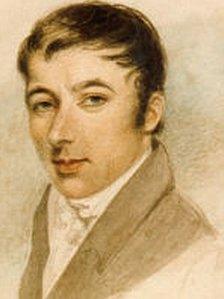Robert Owen: Ceremony marks social reformer's work
- Published

Robert Owen started writing A New View of Society in 1812
Landmark essays written by the so-called father of the co-operative movement are being remembered in a special ceremony in Powys.
Robert Owen, who was born in Newtown in 1771, started work on his writings, A New View of Society, 200 years ago.
The Robert Owen Museum said they inspired change and improved working conditions for hundreds of people.
The museum is holding the event on Saturday, to mark what would have been his birthday on 14 May.
People, along with a choir and Newtown Silver Band, are gathering at Owen's grave in the Powys town.
Pat Brandwood, the curator of the Robert Owen Museum, described him as the first socialist, who believed in co-operation, sharing and educational reform.
"Two hundred years ago Robert Owen started work on a series of articles and lectures. He is known as the father of the co-operative movement and the first socialist," she said.
"He believed what formed character was the type of community a person was brought up in.
"Community had always been there, but creating the right community was the basis for a better world, he felt."
Owen was born in Newtown on 14 May, 1771.
As an adult he moved to London, Manchester and later Scotland, where he famously transformed the New Lanark mill town for the benefit of the workers.
"A New View of Society was set against a backdrop of aggressive industrialisation, terrible conditions for workers in Britain and the Napoleonic Wars," added Mrs Brandwood.
Pioneer
"Children as young as five also worked in dreadful conditions. Robert Owen wanted to take them out of the workplace. He wanted a better world through education, community, sharing and co-operation.
"Within four years of starting his writings he had created his model community in New Lanark, and it very quickly became famous. He inspired change."
Owen, a partner in the mill business, improved housing conditions, while changes in how the mills were run led to a more motivated work force.
Owen also became a pioneer of nursery or early years education, decades before education became compulsory in Britain.
Mrs Brandwood said Owen was still regarded as an important figure by trade unions, politicians and the co-operative movement, and his ideals had been adopted by people in countries around the world.
- Published19 January 2012
- Published10 January 2012
- Published8 January 2012